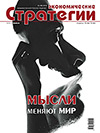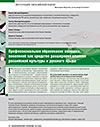Professional Education of Young Generations as a Means of Expanding the Influence of Russian Culture and Russian Language
Keywords:
,
,
,
,
,
The article analyzes the Russian higher education system as an essential part of the “soft power” of Russia’s foreign policy. A comparison is made of the youth potential contingents in the CIS countries in the context of demographic aging. The role of Rossotrudnichestvo in the policy of the Russian language spreading in the post-Soviet space is considered. The authors conclude that Russia is interested in attracting foreign youth to Russian universities and claim the lack of an adequate state policy; they suggest measures to radically change the situation with foreign students’ education in Russian universities.
References:
- Zherebtsova E.V. Razvitie professional’noi mobil’nosti budushchikh spetsialistov: Prakticheskii instrumentarii “myagkoi sily” gosudarstva [Development of Future Specialists’ Professional Mobility: Practical Toolkit of the State “Soft Power”]. Diskurs-PI, 2014, no 2–3, pp. 110–112.
- Rossiiskii statisticheskii ezhegodnik – 2017 [Russian Statistical Yearbook — 2017]. Federal’naya sluzhba gosudarstvennoi statistiki, available at: http://www.gks.ru/free_doc/doc_2017/year/year17.pdf.
- Population ages 65 and above (% of total). The World Bank, 2017, available at: https://data.worldbank.org/indicator/SP.POP.65UP.TO.ZS.
- Demograficheskaya entsiklopediya [Demographic Encyclopedia]. Glavnyi redactor A.A. Tkachenko. Moscow, Entsiklopediya, 2013, 944 p.
- Obaid Al-Youbi A. The development and advancement of higher education in Kingdom of Saudi Arabia. QS Asia News Network, 2017, December, 1.
- Tkachenko A.A. “Myagkaya sila” na evraziiskom prostranstve [“Soft Power” in the Eurasian Space]. Problemy sovremennoi ekonomiki, 2018, no 2, pp. 10–15.
- Barnett N., Knoblokh R. Gosudarstvennye raskhody na obrazovanie v semi samykh bednykh stranakh gruppy SNG-7: skrytyi krizis [Public Spending on Education in the Seven Poorest Countries of the CIS-7 Group: a Hidden Crisis]. Vsemirnyi bank, 2003, 30 p, available at: http://web.worldbank.org/archive/website00504/WEB/PDF/BURNET-5.PDF.
- Besplatnaya ucheba v RF dlya grazhdan Gruzii: usloviya postupleniya v vuzy [Free Study in Russia for Citizens of Georgia: Conditions of Admission to Universities]. Sputnik Gruziya, available at: https://sputnik-georgia.ru/society/20170207/234791235/Besplatnaja-ucheba-v-RF-dlja-grazhdan-Gruzii-uslovijapostuplenija-v-vuzy.html.
- Federal’nyi zakon ot 29 dekabrya 2012 g. № 273-FZ “Ob obrazovanii v Rossiiskoi Federatsii” (poslednyaya redaktsiya) [Federal Law of December 29, 2012 No. 273-ФЗ “On Education in the Russian Federation” (last revised)]. Konsul’tantPlyus, available at: http://www.consultant.ru/document/cons_doc_LAW_140174/
- Batyrbaeva Sh. Rossiya vyigryvaet segodnya, no proigryvaet zavtra [Russia Wins Today, but Loses Tomorrow]. StanRadar.com, 2013, September, 23, available at: http://www.stanradar.com/news/full/4779-ekspert-rossija-vyigryvaet-segodnja-no-proigryvaet-zavtra.html.
- Filimonov G.Yu. Aktual’nye voprosy formirovaniya rossiiskogo potentsiala “myagkoi sily” [Topical Issues of Forming the Russian Potential of “Soft Power”]. Vestnik RUDN, seriya “Politologiya”, 2012, no 1, pp. 67–82.
- Rostovtsev M.I. Izbrannye publitsisticheskie stat’i, 1906–1923 [Selected Publicistic Articles, 1906–1923]. Podgot. teksta, predisl., komment. I.V. Tunkinoi. Moscow, ROSSPEN, 2002, 192 p.



